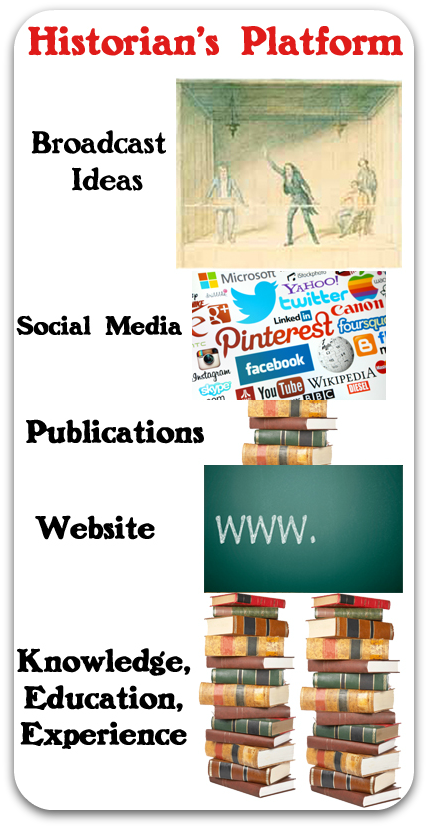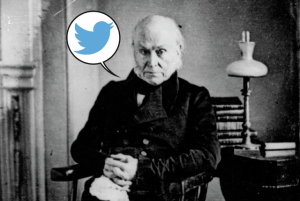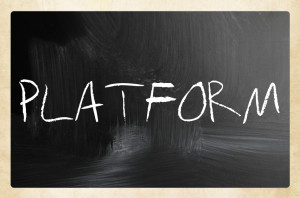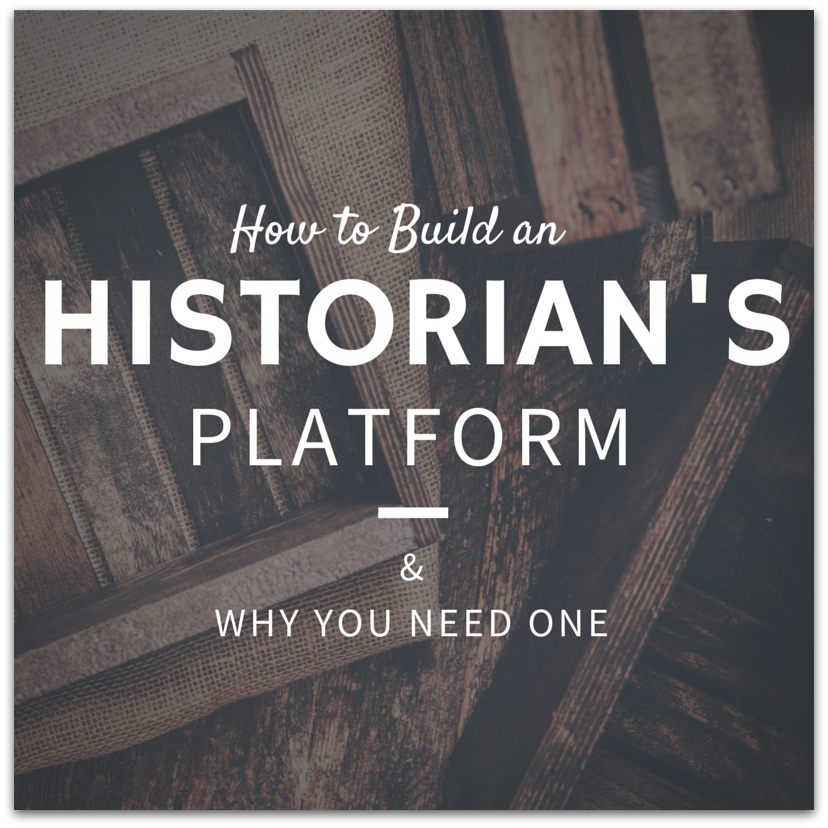Why You Need a Platform & How to Build One
A platform is a suite of tools that you can use to make you and your ideas, research, books, and projects visible to the world.
In this post you will discover why you need a platform and how you can build one.
Why You Need a Platform
Publishers want historians to have platforms because they want their authors to be able to sell books through who they are, who they know, and through social media.
However, an historian’s need for a platform extends further than their publisher’s desire to sell books.
Platforms allow historians to broadcast their ideas beyond their books and classrooms: They enable historians to publicize their ideas and research to the public.
The public needs to know, and in most cases wants to know, about history. A public that knows about the past can learn from successes and mistakes and act in a way that builds a better future.
Historians have the power to affect a better future by empowering the public with information about their history.
Promoting History, Not Propaganda
Glenn Beck and Bill O’Reilly wrote four of the thirteen best-selling history books in the United States in 2014.
Why did their books sell so well?
Aside from the fact that Beck and O'Reilly wrote them without jargon and without copious notes and citations (or any notes or citations), Beck and O’Reilly have platforms.
Historians may not have the platform that Fox News provides these propagandists, but we can put a dent in Beck and O’Reilly's “history” book sales by building platforms en masse.
The individual platforms of many historians will change what the history-loving public understands about history and how they discover and learn about their past.
Together we can make a difference in how the public appreciates and perceives history.
We may also be able to sell more history books.
How to Build a Platform
Platforms consist of several building blocks, or planks, that you can stand on to be heard and seen as a subject-matter expert or authority.
7 Platform Building Blocks
 1. Website: A website should be the first element you build when you create your platform.
1. Website: A website should be the first element you build when you create your platform.
Your website will serve as the primary place where people go to find more information about you and your work.
2. Publications: Published writing highlights your professional knowledge and establishes you as an expert in your field.
Publications also have the ability to connect you with readers.
If you want to create a wide-audience for your work, publish in non-academic magazines, newspapers, and blogs in addition to academic publications.
3. Newsletters: Newsletters provide you with a direct link to your readers and followers.
They work in conjunction with your website to call attention to you and your work.
You will need to develop a mailing list of people you can send your newsletters to if you want to make use of this weekly or monthly platform tool. (This will be the topic of a future post.)
4. Public Speaking: Public speaking engagements such as book talks or lectures at your local library, museum, or historical society provide you with opportunities to present your research and ideas in person.
They also furnish opportunities for your audience to meet you and get to know you as a person.
 5. Social Media: Social media offer powerful outreach and community-building tools you can use to connect with a worldwide audience.
5. Social Media: Social media offer powerful outreach and community-building tools you can use to connect with a worldwide audience.
The popularity of interacting and connecting with other people online has given rise to many different networks, therefore you have a choice in the way(s) you interact with others.
However, bear in mind that the information you post and the community of fans and followers you build on Facebook, Twitter, Google+, etc. ultimately belong to those platforms. Therefore, social media should always be used in conjunction with a personal website, e-mail list, or blog.
6. Education: Education can be an important tool for historians, although not as important as producing a strong body of well-researched and well-presented work.
If you went to graduate school and have a masters or doctorate in history, mention this fact on your website about page and in the byline for your published work.
7. Volunteer Work: People love people who give back to their communities.
If you have helped a local historical society put together an exhibit, led the quest to save a local historic site, or have participated in some other community-minded organization let people know about it.
You can highlight  these humanizing activities in your social media profiles, website about page, or bylines.
these humanizing activities in your social media profiles, website about page, or bylines.
Additionally, volunteer work will help you network with people the old-fashioned way: by placing you in direct contact with other like-minded people. Your fellow volunteers may become your friends and biggest supporters when it comes time to spread the message about the history you study and write about.
Although volunteer work can serve as a powerful tool in your platform, you should only undertake it if you have a passion for a cause and want to better your community.
Conclusions
 A platform comprises a suite of tools you can use to make your ideas, research, books, and projects visible to the world.
A platform comprises a suite of tools you can use to make your ideas, research, books, and projects visible to the world.
This post has outlined seven different elements that you could use to build your platform.
You do not have to adopt and cultivate all seven elements, but you should build a professional website.
As you consider which of the above planks you want to use to build your platform, think about how each element will help you showcase your authority and whether they will give people a good reason to follow you and your work.
Choose elements that will help you highlight your genuine character and humanity. People like to follow and support genuine and helpful individuals.
We have just scratched the surface of platforms.
Over the course of 2015 (and maybe 2016), we will explore all of these platform elements in greater detail because we need to build better platforms if we want to convey our historical knowledge to the large public of history-lovers.
Please let me know if you want to know more about a specific platform element. I will try to write and schedule requested posts sooner rather than later. E-mail | Twitter | Facebook
Resources
 Here are three books about building professional platforms that I recommend:
Here are three books about building professional platforms that I recommend:
Chuck Sambuchino, [simpleazon-link asin="B00FGVWODY" locale="us"]Create Your Writer Platform: The Key to Building an Audience, Selling More Books, and Finding Success as an Author[/simpleazon-link]
Michael Hyatt, [simpleazon-link asin="159555503X" locale="us"]Platform: Get Noticed in a Noisy World[/simpleazon-link]
Seth Godin, [simpleazon-link asin="1591842336" locale="us"]Tribes: We Need You to Lead Us[/simpleazon-link]
